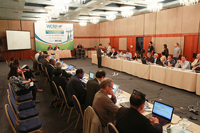- Details
 WCRP community congratulates Dr. James Hurrell for being selected to become the next NCAR director. Jim has served as CLIVAR co-chair for several years and has been involved in several WCRP activities including the successful Open Science Conference that took place in Denver in October 2011.
WCRP community congratulates Dr. James Hurrell for being selected to become the next NCAR director. Jim has served as CLIVAR co-chair for several years and has been involved in several WCRP activities including the successful Open Science Conference that took place in Denver in October 2011.
- Details
 The Science and Technology Alliance for Global Sustainability is launching an open competitive process for the selection of a permanent secretariat for Future Earth. Parties are invited to submit their expression of interest which is the first stage of a three-step process.
The Science and Technology Alliance for Global Sustainability is launching an open competitive process for the selection of a permanent secretariat for Future Earth. Parties are invited to submit their expression of interest which is the first stage of a three-step process.
- Details
 WCRP together with EUMETSAT are planning a symposium to discuss the current state of climate science and climate observations with particular emphasis on the role of space-based Earth observations. The symposium will take place in Darmstadt, Germany, on 13-17 October 2014. Some preliminary information and the first announcement can be found of the Climate Symposium 2014 website.
WCRP together with EUMETSAT are planning a symposium to discuss the current state of climate science and climate observations with particular emphasis on the role of space-based Earth observations. The symposium will take place in Darmstadt, Germany, on 13-17 October 2014. Some preliminary information and the first announcement can be found of the Climate Symposium 2014 website.
- Details
The Working Group on Seasonal to Interannual Prediction (WGSIP) in collaboration with the Centro de Investigaciones del Mar y la Armosfera (CIMA) invites the research community to explore the Climate Historical Forecast Project (CHFP) database for their studies on the seasonal predictability of the global climate. The CHFP database consists of data from retrospective predictions of the seasonal climate from year to year across recent decades. For access the database see the entry page on the CIMA website.
- Details
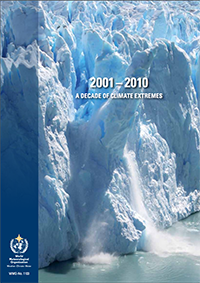 According to a new report by WMO, The Global Climate 2001-2010: a decade of climate extremes, the 2001-2010 decade was the warmest since the start of modern measurements in 1850. The record warmth was accompanied by unprecedented high-impact climate extremes like heat waves in Europe and Russia, floods in Pakistan, droughts in the Amazon Basin, Australia and east Africa, a rapid decline in the Arctic sea ice and accelerated loss of net mass from the world's glaciers.
According to a new report by WMO, The Global Climate 2001-2010: a decade of climate extremes, the 2001-2010 decade was the warmest since the start of modern measurements in 1850. The record warmth was accompanied by unprecedented high-impact climate extremes like heat waves in Europe and Russia, floods in Pakistan, droughts in the Amazon Basin, Australia and east Africa, a rapid decline in the Arctic sea ice and accelerated loss of net mass from the world's glaciers.
- Details
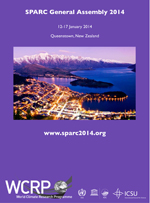
- Details
 As one of the main modulators of heating in the atmosphere, clouds control many aspects of the climate system. Limited understanding of clouds is the major source of uncertainty in climate sensitivity. Over the next 5-10 years WCRP will focus in overcome the main barriers that prevent progress in assessing Climate Sensitivity and future precipitation changes. See the WCRP Grand Challenge on Clouds, Circulation and Climate Sensitivity web pages.
As one of the main modulators of heating in the atmosphere, clouds control many aspects of the climate system. Limited understanding of clouds is the major source of uncertainty in climate sensitivity. Over the next 5-10 years WCRP will focus in overcome the main barriers that prevent progress in assessing Climate Sensitivity and future precipitation changes. See the WCRP Grand Challenge on Clouds, Circulation and Climate Sensitivity web pages.
- Details
 The recently established first Science Committee of Future Earth includes 18 members from the diversity of disciplines and expertises needed to address the global environmental change in all its dimensions. The Science Committee is supported by an interim secretariat whose director, recently appointed, is Professor Frans Berkhout. Read more on the Future Earth website.
The recently established first Science Committee of Future Earth includes 18 members from the diversity of disciplines and expertises needed to address the global environmental change in all its dimensions. The Science Committee is supported by an interim secretariat whose director, recently appointed, is Professor Frans Berkhout. Read more on the Future Earth website.
- Details
- Details
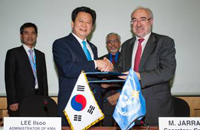 The Korean Meteorological Administration is to host a new International Coordination Office for a project which aims to improve predictions at sub-seasonal to seasonal timescales. This project brings together the weather and climate research communities to solve the unique scientific challenges related to this forecasting time range. Read more in the full news article.
The Korean Meteorological Administration is to host a new International Coordination Office for a project which aims to improve predictions at sub-seasonal to seasonal timescales. This project brings together the weather and climate research communities to solve the unique scientific challenges related to this forecasting time range. Read more in the full news article.
- Details
 The Working Group on Numerical Experimentation (WGNE), jointly sponsored by the Joint Scientific Committee of the World Climate Research Programme and the Commission of Atmospheric Sciences of the World Climate Research Programme, organized a workshop on Systematic Errors in Weather and Climate Models, hosted at the Met Office, Exeter, UK, during 15-19 April 2013. More than 270 people from around the world attended the meeting. Read more in the full news article.
The Working Group on Numerical Experimentation (WGNE), jointly sponsored by the Joint Scientific Committee of the World Climate Research Programme and the Commission of Atmospheric Sciences of the World Climate Research Programme, organized a workshop on Systematic Errors in Weather and Climate Models, hosted at the Met Office, Exeter, UK, during 15-19 April 2013. More than 270 people from around the world attended the meeting. Read more in the full news article.
- Details
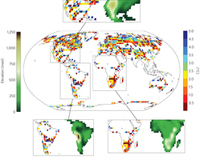 A recent study published in Nature Climate Change suggests that the pace of shifting regional climate zones increases approximately linearly with the increasing global temperature. This implies that species will have increasingly less time to adapt to zone changes in the future, thus increading the risk of extintion. Read the Nature Climate Change letter - Pace of shifts in climate regions increases with global temperaturePace of shifts in climate regions increases with global temperature.
A recent study published in Nature Climate Change suggests that the pace of shifting regional climate zones increases approximately linearly with the increasing global temperature. This implies that species will have increasingly less time to adapt to zone changes in the future, thus increading the risk of extintion. Read the Nature Climate Change letter - Pace of shifts in climate regions increases with global temperaturePace of shifts in climate regions increases with global temperature.- Details
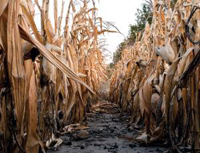 An interesting debate is currently taking place on whether the 2012 US Central Great Plains drought is linked to climate change or it is a result of natural climate variability. The debate sparked after the publication of a NOAA assessment report on the origin of such drought and involves several WCRP affiliated scientists. See the article in the New Scientist.
An interesting debate is currently taking place on whether the 2012 US Central Great Plains drought is linked to climate change or it is a result of natural climate variability. The debate sparked after the publication of a NOAA assessment report on the origin of such drought and involves several WCRP affiliated scientists. See the article in the New Scientist.
- Details
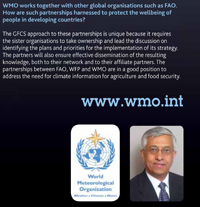 Dr. Ghassem Asrar, Director of WCRP, has been interviewed by the International Innovation magazine on the strategic approach to developing science-based information on climate variability and change for decision makers. The Global Framework for Climate Services developed by WMO will ensure an integrated and holistic approach to climate information and knowledge delivery. Read the article.
Dr. Ghassem Asrar, Director of WCRP, has been interviewed by the International Innovation magazine on the strategic approach to developing science-based information on climate variability and change for decision makers. The Global Framework for Climate Services developed by WMO will ensure an integrated and holistic approach to climate information and knowledge delivery. Read the article.
- Details

- Details
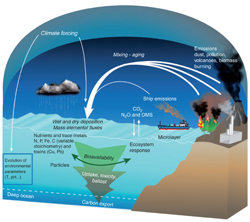
In a recent article published in Environmental Chemistry, SOLAS (Surface Ocean-Lower Atmosphere Study) reviews the critical issues in the exchange of energy, gases and particles at the ocean-atmosphere interface. WCRP is a parent programme of SOLAS together with IGBP and SCOR. Read the CSIRO article - Evolving research directions in Surface Ocean–Lower Atmosphere (SOLAS) science
- Details
The WCRP collaborating with the Africa Climate Policy Center (ACPC) will host the first ever Pan-Africa Climate Research Conference on 15-18 October 2013, in Arusha, Tanzania. All interested researchers and praticioners working on the African climate are invited to submit an abstract... for detailed information go to the conference website.
- Details
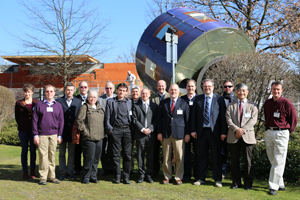
- Details
The CLIVAR-GEWEX Africa Climate Panel has launched a database that aims to strengthen the network of climate scientists in Africa and to serve as an effective way of communicating relevant news and opportunities. It will be used to distribute the WCRP Africa Newsletter, announcements of the Africa Climate Conference and other meetings and training opportunities.
- Details

- Details
- Details
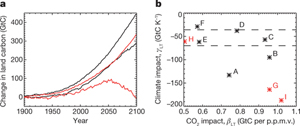 A recent work by Peter Cox, member of WMAC, and collaborators shows how sensitive biological systems are to changes in climate. The study recently, published in Nature magazine, indicates that tropical reinforest wiil release about 50 billion tonnes of carbon for each degree celsius of warming in the tropics. However this carbon release is counteracted by the positive effects of carbon dioxide fertilisation on plant growth so that overall forests are expected to continue to accumulate carbon.... read the article
A recent work by Peter Cox, member of WMAC, and collaborators shows how sensitive biological systems are to changes in climate. The study recently, published in Nature magazine, indicates that tropical reinforest wiil release about 50 billion tonnes of carbon for each degree celsius of warming in the tropics. However this carbon release is counteracted by the positive effects of carbon dioxide fertilisation on plant growth so that overall forests are expected to continue to accumulate carbon.... read the article
- Details
 The CLIMDEX Project aims to produce a suite of in situ and gridded land-based global datasets of indices representing the more extreme aspects of climate. Indices are derived from daily temperature and precipitation data using the definitions recommended by the CCl/CLIVAR/JCOMM Expert Team on Climate Change Detection and Indices (ETCCDI). The project also aims to develop software tools to allow users to access the resulting datasets via a Web interface.
The CLIMDEX Project aims to produce a suite of in situ and gridded land-based global datasets of indices representing the more extreme aspects of climate. Indices are derived from daily temperature and precipitation data using the definitions recommended by the CCl/CLIVAR/JCOMM Expert Team on Climate Change Detection and Indices (ETCCDI). The project also aims to develop software tools to allow users to access the resulting datasets via a Web interface.


